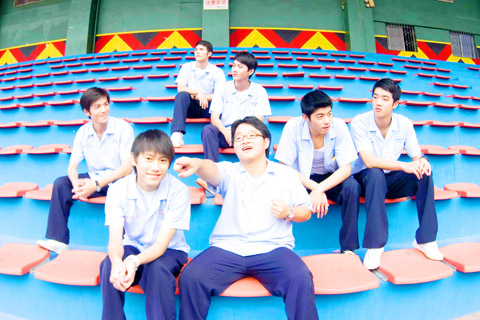Hong Kong showbiz doyen Eric Tsang (曾志偉) liked Taiwanese director Tom Shu-yu Lin’s (林書宇) autobiographic debut feature Winds of September (九降風) so much that it inspired him to produce two more films, both of which also tackle the same topic — youth — and are being made by up-and-coming directors from Hong Kong and China.
The first installment of the Winds of September trilogy, Lin’s coming-of-age tale vividly recreates high school life in mid-1990s Taiwan with a tale of friendship, bonding, disillusionment and betrayal.
Set in Hsinchu in 1996, the film follows a group of seven high school boys who spend their time chasing girls, smoking, drinking beer, engaging in late-night skinny dipping, and rooting for their favorite baseball team. Yen (Rhydian Vaughan), is a Casanova and the group’s charismatic leader who is unaware that the less popular and quieter Tang (Chang Chieh) is secretly in love with his girlfriend Yun (Jennifer Chu). When Tang is beaten up by the boyfriend of one of Yen’s conquests in a case of mistaken identity, friendship and admiration quickly turn into envy and rivalry.

Loyalty and personal integrity are further put to the test when two motorcycle incidents put Sheng (Chiu Yi-cheng) in the police station and Yen in a coma. Meanwhile, news of match fixing in Taiwan’s professional baseball league sweeps across the country like a wildfire.
On graduation day, Tang decides to fulfill a promise he made with Yen and travels south to find their baseball hero. When he arrives he looks onto an empty field, and seems to find the answer he had been seeking.
Title film’s title is a locally coined term for the strong winds blow through Hsinchu, Lin’s hometown, during the ninth month of the lunar calendar. It offers Taiwanese audiences in their thirties a trip down memory lane. With everything from KTV rental shops, BB calls (pagers), and NSR motorcycles to the closing song, I Look Forward To (我期待), sung by Chang Yu-sheng (張雨生), who died in a coma after a car accident in 1997, the period details and sensibilities summon the ambiance of that era and provoke nostalgic flashbacks of teenage days that seem eons away and are yet so close to the heart.

The team of young actors is very well-cast, and audiences will have little difficulty identifying with the characters and following their experiences through this well-structured story.
Director Lin cleverly uses the match-fixing scandal as a metaphor for the end of innocence, as news reports following the prosecution of China Times Eagles players parallels the dissolution of the gang of friends.
Winds is a neatly executed piece. Though the plot is formulaic and offers no surprises, this high school drama about friendship, loyalty, betrayal and disillusionment still moves the heart.


One of the biggest sore spots in Taiwan’s historical friendship with the US came in 1979 when US president Jimmy Carter broke off formal diplomatic relations with Taiwan’s Republic of China (ROC) government so that the US could establish relations with the People’s Republic of China (PRC). Taiwan’s derecognition came purely at China’s insistence, and the US took the deal. Retired American diplomat John Tkacik, who for almost decade surrounding that schism, from 1974 to 1982, worked in embassies in Taipei and Beijing and at the Taiwan Desk in Washington DC, recently argued in the Taipei Times that “President Carter’s derecognition

This year will go down in the history books. Taiwan faces enormous turmoil and uncertainty in the coming months. Which political parties are in a good position to handle big changes? All of the main parties are beset with challenges. Taking stock, this column examined the Taiwan People’s Party (TPP) (“Huang Kuo-chang’s choking the life out of the TPP,” May 28, page 12), the Democratic Progressive Party (DPP) (“Challenges amid choppy waters for the DPP,” June 14, page 12) and the Chinese Nationalist Party (KMT) (“KMT struggles to seize opportunities as ‘interesting times’ loom,” June 20, page 11). Times like these can

Dr. Y. Tony Yang, Associate Dean of Health Policy and Population Science at George Washington University, argued last week in a piece for the Taipei Times about former president Ma Ying-jeou (馬英九) leading a student delegation to the People’s Republic of China (PRC) that, “The real question is not whether Ma’s visit helps or hurts Taiwan — it is why Taiwan lacks a sophisticated, multi-track approach to one of the most complex geopolitical relationships in the world” (“Ma’s Visit, DPP’s Blind Spot,” June 18, page 8). Yang contends that the Democratic Progressive Party (DPP) has a blind spot: “By treating any

You can tell a lot about a generation from the contents of their cool box: nowadays the barbecue ice bucket is likely to be filled with hard seltzers, non-alcoholic beers and fluorescent BuzzBallz — a particular favorite among Gen Z. Two decades ago, it was WKD, Bacardi Breezers and the odd Smirnoff Ice bobbing in a puddle of melted ice. And while nostalgia may have brought back some alcopops, the new wave of ready-to-drink (RTD) options look and taste noticeably different. It is not just the drinks that have changed, but drinking habits too, driven in part by more health-conscious consumers and